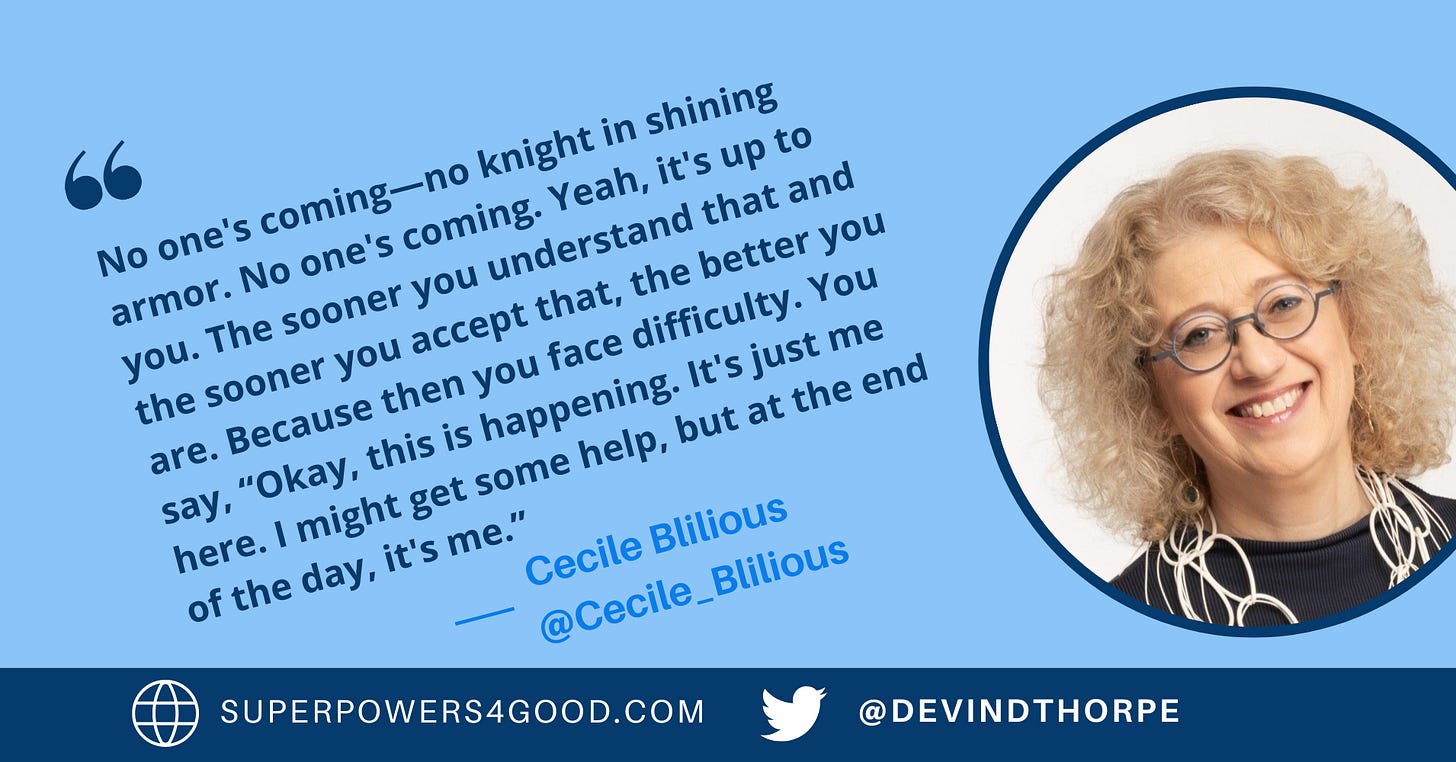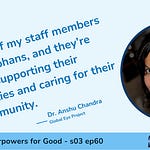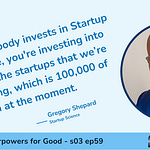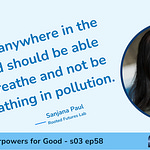Devin: What is your superpower?
Cecile: I don’t think it’s a superpower because most people have it. Maybe we need to migrate people into exercising it, but I do think that grit might be it.
Cecile Blilious has become one of the most significant players in impact investing in Israel, now leading impact and sustainability at the country’s largest fund, Pitango Venture Capital. Founded by Chemi Peres, son of Israel’s former president Shimon Peres, Pitango’s current fund has $3 billion.
“We work out of three parallel funds,” Cecile explains. “One is an early-stage fund that invests very early; two, the growth fund, which invests further than that and all the way to the IPO or exit, and a third fund that focuses on health tech, health, tech, also meaning food, anything to do with human health.”
Cecile has a long history of leading impact investing in Israel. She ran the first fund focused on impact investing with a focus on tech, Impact First Investments.
She officed at Pitango. “I was really embedded in their office, kind of a Trojan horse,” she says. “I joined Pitango three years ago with the idea to bring the paradigm of ESG impacts, just doing the right thing for businesses into mainstream VC.”
“I built a strategy that I call the ESG to SDG continuum because it is a continuum looking at the whole picture,” Cecile says.
She shared her views on ESG:
All companies have to have good ESG standards because it's the right thing to do because it's the best way to manage your business. Because if you have diversity in your team, you'll have better ideas, better solution solving solutions to problems. You'll have just more opportunities. You'll have the best talent. If you think about your carbon emissions as part of your DNA in your corporate, then you will also make sure that you harm the planet less, but you also attract the best employees, and your clients will also be happy about what you do. So, ESG is like the bare minimum that everybody should do.
Cecile now focuses on helping portfolio companies discover their impact and intentionally develop it.
“If you can add to that the impact lens, then let’s do that,” she says. “We won’t force it on anyone who doesn’t have it, which in this case, again, because of our DNA, would be around 30 percent of the companies, just the backbone of the Internet, making wireless faster, things that don’t have any impact. But 70 percent of the companies actually do have an impact, and that’s where we add the impact lens.”
Cecile sees two camps she describes as impact natives who have developed their careers around impact and impact migrants, investors, entrepreneurs, and others discovering the world through this new lens. She helps entrepreneurs in the migrant camp uncover their impact, intentionally develop it and measure it, making it a central part of the business.
In the process of helping companies find impact, she is often able to help them find new revenue streams from expanded markets.
Over the years, she’s developed a formal process. “I designed this process called impact migration, and I just take them through it. I coach the companies through it.”
She challenges entrepreneurs to think about what motivated them to launch a business and remember the problems they hoped to solve. “That’s when you see this aha moment. It’s happened to me many times when I speak to an entrepreneur; I said, ‘okay, let me pitch you your company through my lens.’”
Cecile described the process for a large portfolio company called Via. The company offers a ride-hailing app for use by transit companies as a complement to or even a replacement for buses. Designed around car-pooling in smaller vehicles than conventional city buses, the Via founders focused on the environmental impact of reducing miles driven by empty or nearly-empty public transit.
Cecile helped them discover the social benefits of more efficient public transportation. Suddenly, a group of people for whom public transit didn’t provide a workable solution—think 90-minute-plus commutes with multiple bus transfers—could now commute reliably in 30 minutes.
Via created a map to show the difference in where public transportation could help people get within 30 minutes before and after via, showing the employers, hospitals, schools, universities, parks and malls that became accessible, affordable and efficient.
“We didn’t change anything about the model or the product. We just added a layer that wasn’t there before,” Cecile says.
Throughout her career, Cecile has employed grit as a superpower to help her accomplish important things.
How to Develop Grit As a Superpower
Cecile defines grit this way:
The ability to stick to something that you believe is true and just keep going and keep doing it, even though most times it's hard because people either don't buy into it, they don't believe you, or they think that you're crazy or that you're moving too fast. So, the ability to achieve things I think has been very much attributed to the fact that I have that superpower if you will.
Cecile spent nearly a decade working at Impact First Investments. She describes what she learned there in terms of the grit required:
When I started with Impact First Investments, I was absolutely sure that everyone would just realize that blending capital with tech to create solutions for our world's biggest problems just made sense. And it just till now, it's like absolutely mind-boggling to me that I was among the few people who really were convinced on that. Most people just told me no, that it can't happen. It's not possible. So I was right. You know, in retrospect about that being a thing that really works, I was right about making sure that we expand and retain as much talent and as possible into doing these things.
She also acknowledges that she was wrong about some aspects of how to take impact investing mainstream.
Cecile offers two critical pieces of advice for people looking to strengthen their grit. First is to recognize that you’re on your own.
I raised four children pretty much on my own. Life doesn't give us any candies—not a lot of them, to most of us. You can just decide that it's just too much. You just wish that somebody, someone, would take over. But if you do that, then you lose.
No one's coming—no knight in shining armor. No one's coming. Yeah, it's up to you. The sooner you understand that and the sooner you accept that, the better you are. Because then you face difficulty. You say, “Okay, this is happening. It's just me here. I might get some help, but at the end of the day, it's me.”
So buckle up, and let's just do it. Sometimes you'll still fail, but a lot of times, you'll just get over this bump.
The second is to recognize that overcoming challenges makes you stronger. Cecile says, “A lot of times, beyond the bump is what you’re looking for. There will be more bumps coming, but you’ll be stronger when you address them.”
You can make grit a superpower that enables you to do more good in the world by following Cecile’s example and advice.
















